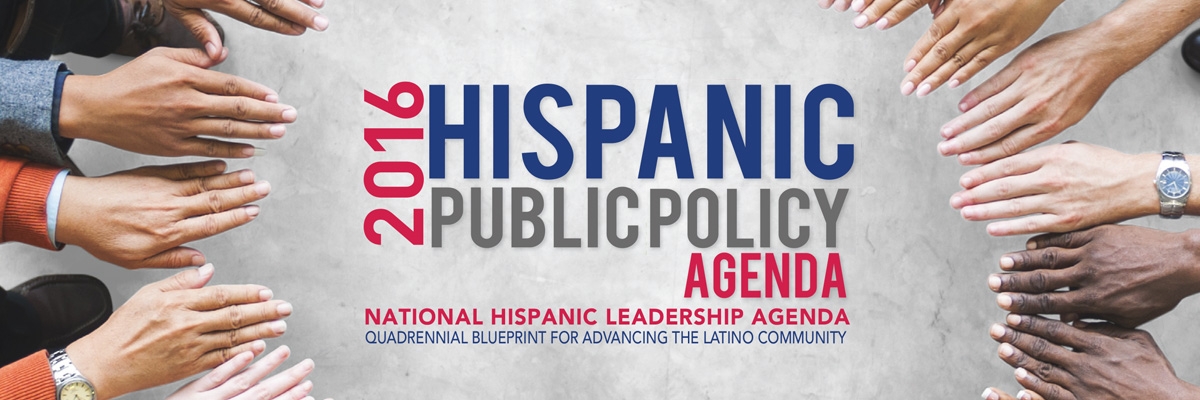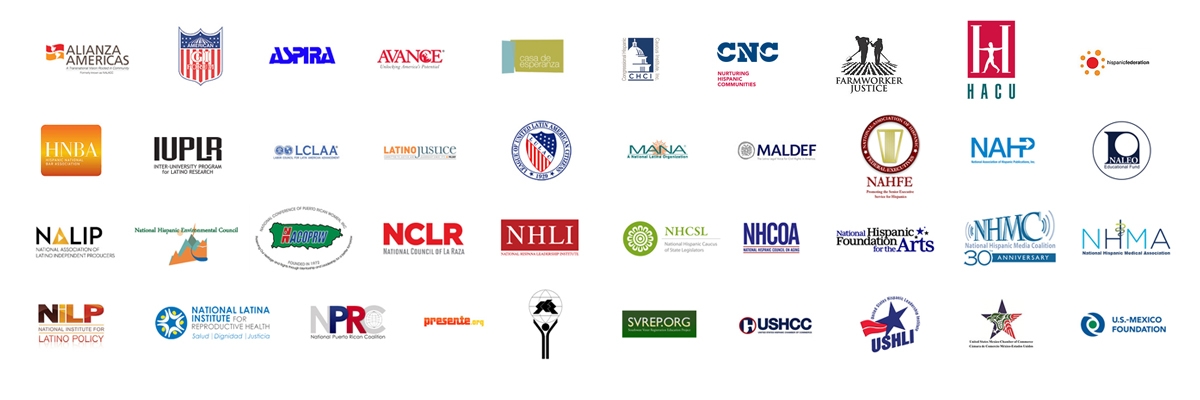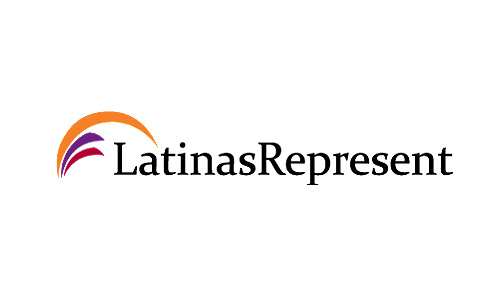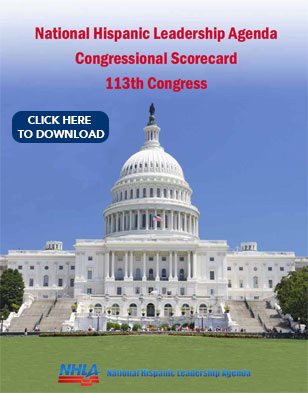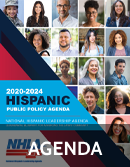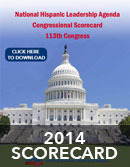PRESS RELEASE
January 24, 2014
LATINO LEADERS ISSUE POLICY PRIORITIES FOR STATE OF THE UNION SPEECH
Letter Urges the President to Push for Immigration Reform, Other Key Measures
WASHINGTON, DC -- Today the National Hispanic Leadership Agenda, a coalition of 36 preeminent national Latino organizations in the country, sent a letter to President Barack Obama respectfully urging the President to mention seven key issues in his State of the Union address next week. NHLA laid out its policy priorities in the areas of immigration, economy and the budget, education, health, Latino inclusion in the federal government, voting rights, and support for Latino Veterans.
Full text of the letter follows.
January 24, 2014
The Honorable Barack Obama The White House 1600 Pennsylvania Avenue NW Washington, DC 20500
Dear President Obama:
On behalf of the National Hispanic Leadership Agenda (NHLA), a coalition of the 36 leading Latino organizations in the United States, I respectfully urge you to include the Latino community’s public policy priorities in your 2014 State of the Union address. Immigration reform remains a top priority for our community, along with job creation, education, the successful implementation of the Affordable Care Act, support for our veterans, and voting rights. Expanded Latino inclusion in your administration also remains a priority as it will improve the reach of public services to Latinos and amplify our growing community’s social and economic contributions to the strength of the nation. Following are key points on these seven topics.
1. Immigration
Securing immigration reform in 2014 continues to be a top priority for Latino families and immigrant communities aspiring for reforms that are meaningful, inclusive, functional, and just. The success of reforms to our nation’s immigration laws and policies will depend on the opportunities created by legislation and pursued by immigrant families to build better lives, achieve residency and citizenship, and more fully contribute to our nation and economy. As such, immigration reform must support the health, dignity, and success of every aspiring citizen by: ensuring a direct and fair roadmap to citizenship; enabling families to be together; establishing greater educational, employment, and entrepreneurial opportunities; and expanding opportunities for health and economic prosperity. The ability of immigrant communities to contribute to our nation’s shared prosperity will be in correlation with how fully we make them part of our economic, social, political and cultural fabric.
In the immediate term, immigrant communities are in desperate need for relief from current detention and deportation practices. We implore you to thoroughly explore ways in which your Administration could do more about this matter to prevent further family separations.
2. The Economy and Federal Budget
We welcome your speech last month on income inequality and the need to focus on growing the economy rather than continuing austerity measures. One of the Latino community’s greatest assets is its entrepreneurial spirit, which contributes to a disproportionately large part of small business growth in America. Focusing on a pro-growth economic policy will create new opportunities for these businesses, resulting in greater job creation and a better life for Latino families.
The nation also needs to prepare for large-scale shifts in labor force demographics, both locally and globally, as well as shifting global economics. Our ability to prepare for these fundamental changes -- through increasingly interconnected systems, more effective and targeted education and training, as well as collaborative partnerships with the corporate and private sector -- will be essential to sustain the United States’ role as a global leader and to ensure a better quality of life for future generations of Americans.
The Latino community was among those hardest hit by the Great Recession -- suffering higher rates of unemployment, foreclosure, and loss of household wealth. Today, the unemployment rate among Latinos continues to be higher than the national average.
Successive rounds of budget cuts, starting in 2011, have eroded many programs that help Latino working families make ends meet and build a brighter future. While the recently enacted Bipartisan Budget Act will provide some relief from arbitrary sequester cuts this year, funding for discretionary domestic programs will remain inadequate -- at almost 15 percent below 2010 funding levels when adjusted for inflation. If this downward trend continues, then by the time your presidency concludes, federal funding for domestic priorities (including poverty fighting programs like education, child care, job training and rental assistance) is projected to be at its lowest share of GDP since 1962.
By more than three-to-one, budget cuts far outweigh the amount of new revenue generated by recent budget deals. The wealth of those at the top of the income ladder has increased significantly over the past decade while the middle class has struggled to stay afloat, making it unconscionable to continue placing the burden of deficit reduction on middle and lower income individuals. It is time to ask those who benefit most from growing income inequality to pay a greater share toward important domestic priorities that will invest in our future so that we can grow the economy, provide greater opportunity to Latino workers and entrepreneurs, and ultimately benefit the nation as a whole.
3. Education
Latinos are strongly united in recognizing the critical role education plays in accessing the American Dream. Indeed, investments in education can lead to a more skilled workforce that is better able to compete in the global marketplace. It is important to support early childhood education and programs that ensure Latino students are prepared for higher education if they so choose. Keeping in mind that the primary obstacles keeping Latino students from higher education are often financial, more must be done to lower the costs of higher education and make the pipeline for achievement more accessible.
Hispanic-Serving Institutions (HSIs) are the backbone of higher education and training for Latinos and other underserved populations. As such, they need to be better supported by all levels of government. As crucial as they are for the education of the overwhelming majority of the nearly 3 million Hispanic college students and over 4 million students from all walks of life, HSIs receive a mere 68 cents for every federal dollar going to all other institutions per student annually. This gap in federal support must be closed and necessary funding must be provided so that HSIs may offer more and better educational opportunities -- particularly in science, technology, engineering, and math (STEM) education. The workforce and economic needs of the nation demand equitable federal support for HSIs.
HSIs and Hispanic Americans are a natural bridge for American international education and policy initiatives, particularly with the Western Hemisphere. As a key part of America’s history and future, they also have a keen understanding of (and cultural affinity with) other countries where we need to strengthen our presence in international education, cultural exchanges, and commerce. The more than 55 million Hispanic Americans and HSIs are an invaluable resource that our nation should optimize internationally.
4. Affordable Care Act and Women’s Health
The Latino community has greatly benefitted from the reforms of the Affordable Care Act, which has given our community the tools to narrow Latino health disparities through: prevention programs that address obesity and chronic diseases, lower prescription drug costs, increased opportunities to expand the number of Latino health professionals, and access to affordable, quality healthcare for over 10 million Latinos who are currently uninsured. Repealing the Affordable Care Act would be a major step backwards for the health and well-being of Latinos.
Latinos suffer from certain illnesses at higher levels than white Americans. In fact, while Latinos are less likely to have heart disease compared to non-Hispanic whites primarily due to their young median age, they face higher rates of certain risk factors -- like high blood pressure, obesity and diabetes -- that can lead to heart disease. Latinos also experience disproportionately high rates of diabetes, HIV, asthma, unintended pregnancy, sexually transmitted infections and other health issues. Furthermore, according to the latest statistics from the Centers for Disease Control and Prevention (CDC), Latinas have the second highest cervical cancer incidence and mortality rates. With increased access to healthcare coverage and affordable preventative care, the Latino community will be able to detect and treat diseases sooner and live healthier lives.
Our community has long awaited the day when access to quality, affordable healthcare would became a reality. Contraception is a critical component of healthcare considering that planning and spacing pregnancies improves the health of a woman and her children by reducing the risks of maternal death, low birth weight, and infant mortality. Latinas, including Catholic Latinas, resoundingly support the women’s preventive coverage benefit. In fact, 89 percent of Latina voters ages 18-34 support the requirement that health plans cover birth control at no cost. Research from the National Latina Institute for Reproductive Health shows that Latinas want the full range of birth control options available to them, from the birth control pill to condoms to intrauterine devices. We applaud the administration’s support of the birth control benefit provided under the ACA and as national Latino leaders proudly stand with you.
5. Latino Inclusion in Federal Government
While we remain disappointed at Latino under-representation in the federal government, from the civilian career workforce up through political and Cabinet-level appointments, we applaud you for the many talented Hispanic women and men you have successfully recruited to join your administration. As we continue our work to identify talented candidates for positions across the federal government, where Latinos have been a relatively stagnant 8 percent of the career workforce, we ask that you empower the Office of Personnel Management Director Katherine Archuleta with the ability to implement any and all reforms that will remove barriers and attract more talented Latinos to serve our nation at the federal level. It is also critical that you and congressional leaders of both parties work to move swift confirmation processes for highly qualified candidates. Your leadership and commitment to the issue of Latino inclusion across career and political positions in your Administration is something we hope to both hear in your remarks and see in the remaining three years of your term.
6. Voting Rights
Just as the Latino electorate is reaching nationally significant numbers, the Supreme Court’s ruling in Shelby County v. Holder dramatically eroded the ability to protect millions of Latino voters from discriminatory practices that would dilute their vote. We welcome the introduction of the bipartisan Voting Rights Amendment Act (H.R. 3899 and S. 1945), introduced by Rep. James Sensenbrenner, Rep. John Conyers Jr., Sen. Patrick Leahy and others to reinstate the pre-clearance mechanism of reviewing proposed changes to voting practices and electoral districts for any potential Voting Rights Act violations in jurisdictions with egregious histories of voting rights violations.
In order to effectively guarantee Latinos an equal place in polling places and fair representation, we will also support amendments to H.R. 3899 that address particular threats to Latino voters. Such amendments include requiring pre-clearance for certain electoral practices that have historically been used to suppress minority voting strength and in jurisdictions experiencing more recent increases in population diversity -- regardless of their past history of discrimination -- so that the new Voting Rights Act serves a dynamic and fast-evolving twenty-first century America.
7. Latino Veterans
Hispanic Veterans have served our country since the American Revolution and in all our wars since then. They have distinguished themselves with 44 Medals of Honor and continue to serve in all branches of our armed forces, active, reserves and states National Guard. Our country can and must do more to provide the support and benefits to our veterans who have protected our freedom and liberty.
The priorities above are not just important to the Hispanic community – they are the cornerstones of a strong future for America and its territories. By elevating these priorities in your State of the Union address, you will send a strong message to the nation and be able to count on the support of Latinos across the nation in helping you make them a reality.
Respectfully submitted,
Hector Sanchez Chair, National Hispanic Leadership Agenda Executive Director, Labor Council for Latin American Advancement
# # #
Established in 1991, the National Hispanic Leadership Agenda (NHLA) brings together Hispanic leaders to establish policy priorities that address, and raise public awareness of, the major issues affecting the Latino community and the nation as a whole. Earlier this year, NHLA launched the Latinos United for a Fair Economy campaign. For more information, please visit www.nationalhispanicleadership.org and follow @NHLAgenda.
FOR MORE INFORMATION, CONTACT: | Melody Gonzales | This email address is being protected from spambots. You need JavaScript enabled to view it. | ![]() (202) 508-6917 | | Brenda Arredondo | This email address is being protected from spambots. You need JavaScript enabled to view it. |
(202) 508-6917 | | Brenda Arredondo | This email address is being protected from spambots. You need JavaScript enabled to view it. | ![]() (915) 373-1483 |
(915) 373-1483 |
__________________________________________________________
American GI Forum | ASPIRA Association, Inc. | Avance | Casa de Esperanza | Cuban American National Council | Farmworker Justice | Hispanic Association of Colleges & Universities | Hispanic Federation | Hispanic National Bar Association | Labor Council for Latin American Advancement | Latino Justice PRLDEF | League of United Latin American Citizens | MANA, A National Latina Organization | Mexican American Legal Defense & Educational Fund | National Alliance of Latin American & Caribbean Communities | NALEO Educational Fund | National Association of Hispanic Federal Executives | National Association of Hispanic Publications | National Association of Latino Independent Producers | National Conference of Puerto Rican Women, Inc. | National Council of La Raza | National Hispana Leadership Institute | National Hispanic Caucus of State Legislators | National Hispanic Council on Aging | National Hispanic Environmental Council | National Hispanic Foundation for the Arts | National Hispanic Media Coalition | National Hispanic Medical Association | National Institute for Latino Policy | National Latina Institute for Reproductive Health | National Puerto Rican Coalition, Inc. | SER – Jobs for Progress National, Inc. | Southwest Voter Registration Education Project | United States Hispanic Chamber of Commerce | United States-Mexico Chamber of Commerce | U.S. Hispanic Leadership Institute


